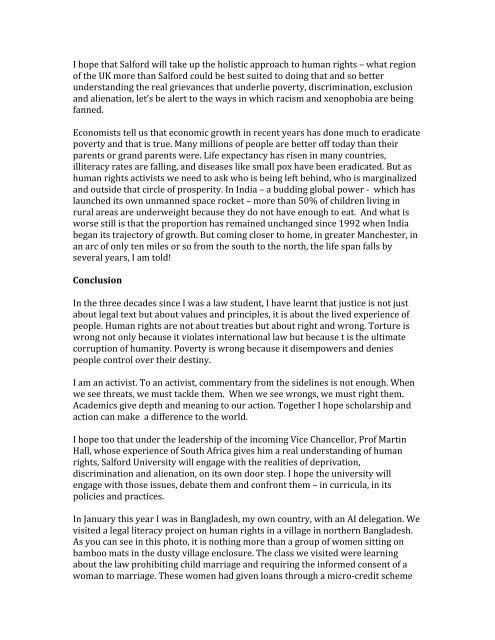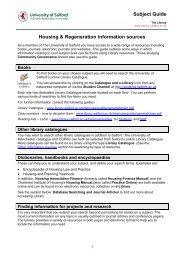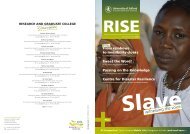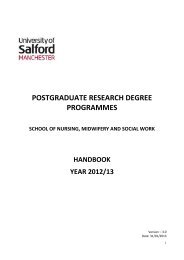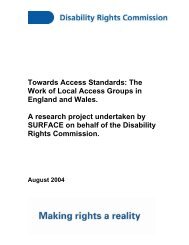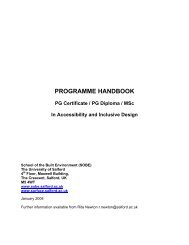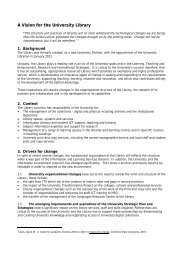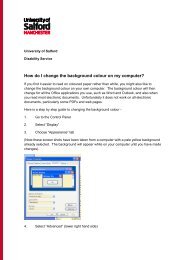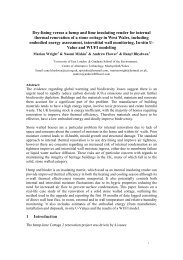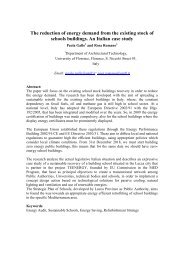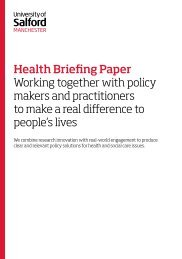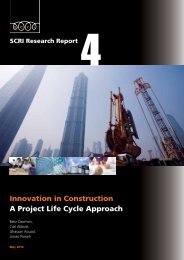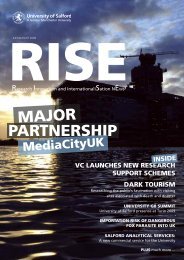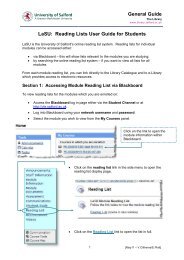Chancellor Dr Irene Khan â Installation Speech - University of Salford
Chancellor Dr Irene Khan â Installation Speech - University of Salford
Chancellor Dr Irene Khan â Installation Speech - University of Salford
- No tags were found...
You also want an ePaper? Increase the reach of your titles
YUMPU automatically turns print PDFs into web optimized ePapers that Google loves.
I hope that <strong>Salford</strong> will take up the holistic approach to human rights – what region <strong>of</strong> the UK more than <strong>Salford</strong> could be best suited to doing that and so better understanding the real grievances that underlie poverty, discrimination, exclusion and alienation, let’s be alert to the ways in which racism and xenophobia are being fanned. Economists tell us that economic growth in recent years has done much to eradicate poverty and that is true. Many millions <strong>of</strong> people are better <strong>of</strong>f today than their parents or grand parents were. Life expectancy has risen in many countries, illiteracy rates are falling, and diseases like small pox have been eradicated. But as human rights activists we need to ask who is being left behind, who is marginalized and outside that circle <strong>of</strong> prosperity. In India – a budding global power -‐ which has launched its own unmanned space rocket – more than 50% <strong>of</strong> children living in rural areas are underweight because they do not have enough to eat. And what is worse still is that the proportion has remained unchanged since 1992 when India began its trajectory <strong>of</strong> growth. But coming closer to home, in greater Manchester, in an arc <strong>of</strong> only ten miles or so from the south to the north, the life span falls by several years, I am told! Conclusion In the three decades since I was a law student, I have learnt that justice is not just about legal text but about values and principles, it is about the lived experience <strong>of</strong> people. Human rights are not about treaties but about right and wrong. Torture is wrong not only because it violates international law but because t is the ultimate corruption <strong>of</strong> humanity. Poverty is wrong because it disempowers and denies people control over their destiny. I am an activist. To an activist, commentary from the sidelines is not enough. When we see threats, we must tackle them. When we see wrongs, we must right them. Academics give depth and meaning to our action. Together I hope scholarship and action can make a difference to the world. I hope too that under the leadership <strong>of</strong> the incoming Vice <strong>Chancellor</strong>, Pr<strong>of</strong> Martin Hall, whose experience <strong>of</strong> South Africa gives him a real understanding <strong>of</strong> human rights, <strong>Salford</strong> <strong>University</strong> will engage with the realities <strong>of</strong> deprivation, discrimination and alienation, on its own door step. I hope the university will engage with those issues, debate them and confront them – in curricula, in its policies and practices. In January this year I was in Bangladesh, my own country, with an AI delegation. We visited a legal literacy project on human rights in a village in northern Bangladesh. As you can see in this photo, it is nothing more than a group <strong>of</strong> women sitting on bamboo mats in the dusty village enclosure. The class we visited were learning about the law prohibiting child marriage and requiring the informed consent <strong>of</strong> a woman to marriage. These women had given loans through a micro-‐credit scheme


